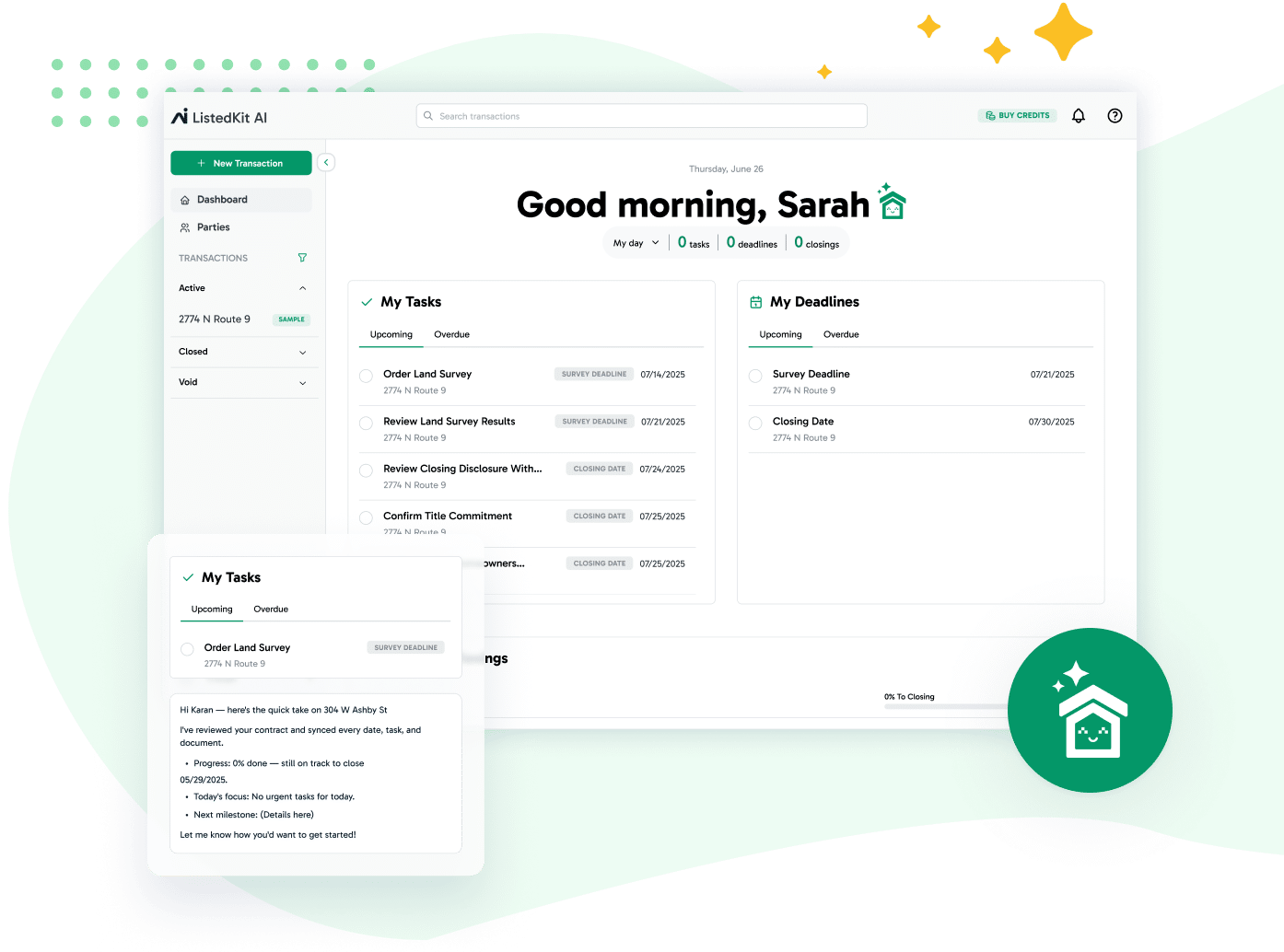Like any other startup small business, running your transaction coordination company is full of surprises, especially regarding expenses. You may think you have foreseen everything, from subscriptions to software and an improved marketing plan, but these hidden costs somehow show up and knock even the most detailed budget off its tracks.
If you’re not prepared, unexpected expenses can disrupt your cash flow, delay your growth, and create unnecessary stress.
In this guide, we highlight the most overlooked expenses when opening a TC business and how to budget for them in an easy, practical way.
Hidden Startup Costs of a TC Business Overview
Hidden costs often fall into these key categories:
- Legal and Administrative Expenses. Registration fees, licensing, and insurance ensure compliance with local legal requirements and protect your business from liability.
- Tools and Technology Beyond Software. Reliable hardware, secure document storage, and communication tools are essential for managing the transaction process efficiently.
- Training and Professional Development. Certifications, memberships, and ongoing learning ensure you stay competitive and credible in real estate.
- Operational and Miscellaneous Costs. Office supplies, branding efforts, and client gifts foster a professional image and build strong client relationships.
- Emergency and Contingency Funds. Unplanned expenses like equipment failure or sudden legal disputes can derail your progress without contingency plans.
Legal and Administrative Expenses
Legal and administrative expenses are crucial to establishing a well-structured TC business. Without them, you risk compliance issues, misunderstandings, or even costly disputes.
Business Registration and Licensing
Setting up your business entity is foundational. Depending on your state, forming an LLC can range from $50 in Colorado to $500 in Massachusetts, but a sole proprietorship may have different requirements and costs.
If your chosen business name differs from your legal name, you may also need to file a Doing Business As (DBA) name.
- Example: In California, filing a DBA costs between $10 and $100, depending on the county. This ensures compliance with local laws and helps maintain a clear business plan.
Insurance
One common mistake TCs make when starting a business is not getting Errors and Omissions (E&O) insurance. This is critical to safeguarding your track record and protecting against potential claims. It addresses risks like mistakes or delays in real estate transactions.
Contracts and Legal Consultation
Service agreements clarify deliverables, timelines, and payment terms, helping mitigate performance uncertainty during the growth phase of your business.
Hiring a local lawyer to draft contracts for transaction coordinators can cost $300-$1000 per contract.
Tips for Budgeting
- Allocate 5%-15% of your financial plan for legal and administrative costs.
- Research lawyers specializing in real estate law or contracts with title companies.
- Compare local and digital options to meet both financial and strategic goals.
Tools and Technology Beyond Software
While software like CRM and transaction management tools are essential, overlooking hardware and infrastructure needs can hinder productivity and client satisfaction.
Hardware Costs
High-performance hardware is critical for managing detailed client files, attending video meetings, and ensuring seamless CRM operations.
While entry-level laptops may handle basic tasks, they’re not suitable for the workload of a busy TC.
- Example: A laptop with 8GB of RAM may suffice for email and document editing. However, handling complex PDF floor plans or hosting Zoom calls with multiple participants often requires a device with at least 16GB of RAM and an SSD drive, costing $500 or more.
Printer, Scanner, and Shredder
Handling sensitive real estate documents necessitates reliable office equipment.
- A high-resolution scanner ($250-$500) is ideal for creating polished, professional copies of contracts or client presentations.
- A secure shredder ($150–$650) ensures that sensitive information is destroyed properly, maintaining confidentiality and compliance.
- A subscription to Adobe Acrobat PDF Pro ($13–$24/month) can be invaluable for redacting, editing, or securely sharing documents with your clients.
Internet and Phone Services
Reliable internet is crucial for uninterrupted communication and accessing cloud-based tools. Similarly, a dedicated business phone line, such as Google Voice, adds professionalism.
Practical Solutions
- Consider purchasing refurbished or lightly used equipment from trusted sellers to save money.
- Bundle internet and phone services to lower monthly costs.
Investing in reliable hardware and infrastructure reduces downtime, boosts efficiency, and builds client trust through seamless operations.
Training and Professional Development
Investing in your knowledge and credentials pays dividends by enhancing your expertise, credibility, and marketability as a transaction coordinator.
Training Programs or Certifications
Certifications and training courses provide a foundation of industry knowledge and set you apart from competitors.
Memberships and Networking
Joining professional organizations connects you with industry peers and offers access to exclusive resources.
Ongoing Learning
Staying informed about market, regulatory changes, and technology trends is critical for real estate transaction coordinators to remain competitive and deliver exceptional service.
Examples of Relevant Ongoing Learning
- Regulatory Updates on Disclosure Requirements. Attending a state-specific workshop on updated property disclosure laws can help TCs understand new seller requirements. This knowledge can allow them to proactively guide agents and ensure compliance, potentially avoiding delays in closing.
- Workshops on Earnest Money and Escrow Management. Participating in a webinar on escrow best practices could provide valuable insights into managing earnest money disputes and ensuring escrow compliance. This could help a TC resolve misunderstandings between parties and keep deals on track.
- Seminars on Fair Housing Laws. A TC attending a real estate fair housing seminar might learn to identify and avoid discriminatory practices, ensuring compliance with regulations and building investor confidence.
Actionable Tip
Evaluate any training or membership opportunity’s return on investment (ROI). For example, consider how the cost compares to the potential for increased client retention, referrals, or project efficiency.
Operational and Miscellaneous Costs
Operational and miscellaneous expenses often go unnoticed when budgeting for a TC business, but they are crucial in ensuring productivity and professionalism.
Office Setup
A well-equipped workspace improves efficiency and reduces physical strain during long workdays.
For example, investing in an ergonomic chair ($300), dual monitors ($150), and a sit-stand desk ($500) can help you work comfortably for extended hours, leading to fewer health issues and increased output.
Additional essentials like filing cabinets or cloud storage subscriptions ensure that documents remain organized and secure.
Professional Branding
First impressions are vital in establishing trust and credibility with clients. Professional branding creates a polished, approachable image for your business.
A professionally designed website with testimonials, service pages, and contact forms can cost around $300 or more, depending on who you hire. However, it can convert website visitors into paying clients, providing a strong return on investment.
If your budget is limited, DIY tools like Canva or Wix offer cost-effective options for logos or starter websites.
Client Gifts or Welcome Kits
According to industry reports, customers who receive a gift are 64% more likely to return for additional services within three months than those who don’t. However, if not planned strategically, this can still add up to operational costs over time.
Budgeting Advice
Start small with essential items and gradually upgrade as your business grows. Prioritize quality over quantity for lasting value.
Taxes and Accounting
Taxes and accounting are unavoidable aspects of running a TC business. Proper management of these costs not only ensures compliance but also identifies opportunities for savings.
Tax Preparation and Filing
Hiring a CPA to handle your tax preparation is a wise investment, particularly for navigating the complexities of deductions in a service-based business.
- Example: A TC who tracks home office expenses, business mileage, and software subscriptions could see substantial savings by working with a CPA familiar with real estate services. These savings might free up funds for reinvestment or operational needs, depending on the scope of deductions applicable to their business.
Accounting Software
Using tools like QuickBooks simplifies expense tracking, invoicing, and financial reporting, saving time and effort.
- Example: A TC might save five hours monthly by automating bookkeeping tasks through QuickBooks. This time could then be redirected to managing client transactions or expanding their client base, boosting business growth potential.
Self-Employment Tax
As an independent contractor, you must pay a 15.3% self-employment tax. It includes Social Security and Medicare contributions. Quarterly payments are essential to avoid penalties.
If you owe $10,000 in taxes, missed your deadline, and failed to pay for 6 months, you could incur a failure to pay a penalty of 0.5% of the unpaid taxes per month. For a tax liability of $10,000, this penalty amounts to $50/month, totaling $300 after 6 months.
Additionally, the IRS charges interest on unpaid taxes and penalties, increasing your overall debt further.
Emergency and Contingency Funds
No matter how detailed your financial plan is, emergencies that disrupt your business strategy can arise.
Unexpected Costs
- Equipment failure, such as a laptop crash, can halt operations.
- Legal disputes or unanticipated market shifts may demand sudden expenditures.
Suggested Reserve
Setting aside 10–20% of your financial model ensures your business can handle uncertainties.
Practical Tip
Consider opening a high-yield savings account for your contingency fund. This approach allows your emergency funds to grow passively while remaining easily accessible when needed.
Conclusion: Planning for Success
Hidden startup costs associated with creating your business, such as lawyer fees, hardware upgrades, professional branding, and contingency funds, add up easily if you do not factor them into the original business plan.
Set yourself up for success by developing a financial plan that encompasses all operational and emergency costs. Prioritize investments that will help improve client relationships, customer satisfaction, and long-term growth potential.
By nipping these hidden costs in the bud, you’ll be guaranteed a smooth-running business that will enable you to provide excellent service and build your client base.
For more helpful tips, actionable insights, and strategies, subscribe to our newsletter and stay up-to-date with everything related to transaction coordination and real estate.




